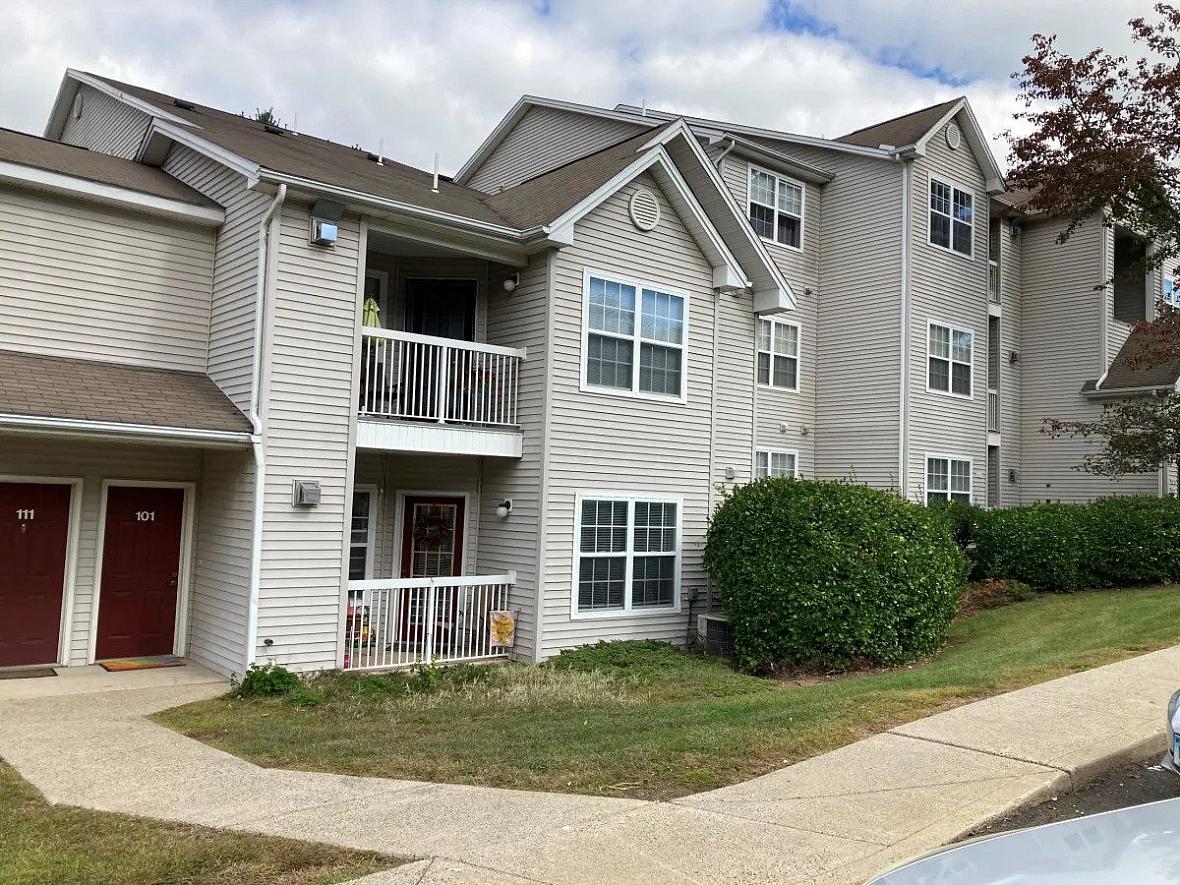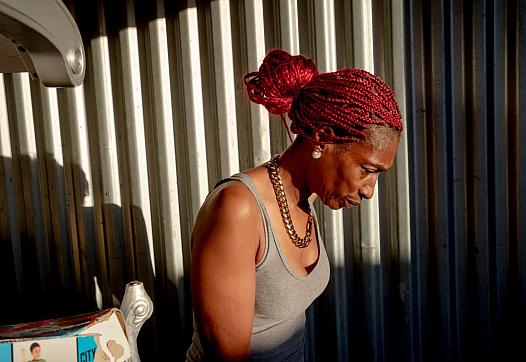CT zoning reform bills an attempt to address housing crisis
The story was originally published in CT Mirror with support from the USC Annenberg Center for Health Journalism’s 2022 National Fellowship.

The Griswold Hills apartment complex in Newington offers a mix of affordable and market-rate apartments. Housing advocates and local officials say the complex is an example of how the state's affordable housing law works.
TOM CONDON / CT MIRROR
Lawmakers have moved several zoning reform measures through the committee process this session, a major part of Democrats’ push to address the housing crisis in Connecticut.
The Planning and Development Committee finished its last scheduled meeting of the legislative session Friday and passed House Bill 6890, also known as the Work, Live, Ride bill. Members also approved Gov. Ned Lamont’s housing bill, which includes financial support for transit-oriented development.
H.B. 6890 would urge towns to increase residential density near public transit stations by giving those municipalities that decide to adopt that type of zoning reform priority for certain infrastructure grants.
These committee votes are the first steps forward in the legislative process.
Earlier this year, the Housing Committee also passed House Bill 6633, the fair share bill. It would require towns to plan and zone for a certain number of units of affordable housing based on the needs of the region, which would be determined in an assessment.
The Work, Live, Ride bill and the fair share bill aim to help address a lack of housing in Connecticut.
“We are hearing, over and over again, the fact that we need this housing,” said Rep. Eleni Kavros Degraw, D-Avon, co-chair of the Planning and Development Committee. She added that she hopes members keep in mind various types of needs, including senior housing.
The state lacks more than 89,000 units of housing that are affordable and available to the lowest income renters, according to estimates from the National Low Income Housing Coalition.
Housing and land use experts, as well as zoning reform advocates, have said this is largely because local zoning ordinances make it hard to build multi-family housing in much of the state. Multi-family housing tends to be more accessible to people with low incomes. Restrictive zoning has historically been used to keep certain groups, especially people of color, out of particular neighborhoods and communities.
“We didn’t accidentally end up one of the most segregated — economically and racially — states in the country,” said Rep. Roland Lemar, D-New Haven, during Friday’s meeting. “That didn’t happen by accident.”
Lemar said he supported the transit-oriented development bill but feared it didn’t go far enough. More will have to be done to address the state’s housing crisis, he said.
Opponents of the measures have said they weaken local control and impose one-size-fits-all approaches to zoning that aren’t practical for all of Connecticut’s municipalities.
Sen. Tony Hwang, R-Fairfield, said the transit-oriented development bill was essentially the state sending a message to its towns that “‘we know better than you, and because you have not done certain things, we are going to do it for you,’” Hwang said Friday. “And that, to me, is overreaching.”
Transit-oriented development
Connecticut has long grappled with the best way to reform zoning. This is the third session in a row that Desegregate CT, a group of housing and land use policy advocates that operates under the Regional Plan Association, has pushed for some type of transit-oriented communities bill.
The idea is that by increasing residential density near transit stations, people will be able to live in communities that are easily walkable with quick access to transportation. Advocates say it will be an environmental boon and encourage business development near these stations.
The bill also includes a sliding scale to encourage different levels of affordability.
Desegregate CT Director Pete Harrison said in public testimony that the bill aims to address town officials’ concerns by having the state work with localities to plan these communities.
“Work Live Ride aims to reject, once and for all, this false choice of ‘local control’ vs ‘state mandates,’” Harrison wrote in his public testimony. “We are not just residents of a specific town or city, and we’re not just residents of Connecticut. We are both.”
During Friday’s meeting, some legislators said that because the bill would prioritize certain infrastructure funding for towns that opt in, it’s not a genuine opt in but a mandate.
“This bill essentially puts a gun to the head of municipalities,” said Rep. Doug Dubitsky, R-Chaplin.
This session, Republicans have asked for reforms to 8-30g, an affordable housing law that offers court remedies to developers who are denied permits to build affordable housing in towns that have less than 10% of their housing stock designated as affordable. The 10% includes deed-restricted affordable housing such as public housing, homes paid for in part by housing choice vouchers or homes that have set-aside affordability and are developed using government money.
Republicans want to broadly expand the definition to include housing that’s not deed-restricted but is lower cost. Housing experts fear this would put many towns over the 10% without any actual increase to their affordable housing stock.
“I think if we’re going to address housing, then 8-30g needs to be a part of the conversation,” said Rep. Joe Zullo, R-East Haven, a ranking member for the committee.
The Republican caucus bill did not get a vote in the Housing Committee.
Fair share
Kavros DeGraw said in an interview Monday that the transit-oriented development bill is a “conversation in progress” and that members want to see how it would work in conjunction with other zoning bills under consideration, including House Bill 6633.
H.B. 6633, known as the fair share bill, would require municipalities to plan and zone for a set number of units of affordable housing based on the needs of the region. Growing Together CT, a group of nonprofits, advocacy and faith organizations from across the state, is pushing for the bill.
The bill’s financial analysis estimates that it would cost the state Office of Policy and Management about $228,800 in fiscal year 2024 and $27,700 in fiscal year 2025. The state comptroller and Department of Housing would also have some cost. It also says there would be “potentially significant cost” to municipalities beginning in fiscal year 2025. The cost is composed of various expenses including hiring consultants and staff to develop plans and conduct assessments.
The fair share concept has been implemented in New Jersey and led to the creation of thousands more housing units.
“Connecticut is one of the most expensive places to find housing in the country,” said Erin Boggs, executive director at Open Communities Alliance, one of Growing Together Connecticut’s members, in a December press conference announcing the push for legislation. “We are also one of the most segregated places in the country.”
The bill aims to address that segregation and increase affordable housing in Connecticut.
It’s faced some similar pushback to the transit-oriented development bill. Town officials have said its requirements are onerous and wouldn’t work for every town.
But proponents say it’s one method to add affordable housing in Connecticut that still allows towns to do their own planning while requiring them to make moves, particularly in some towns that have been reluctant to change their zoning.
Other measures
Both Housing and Planning and Development have been busy this session.
The Housing Committee approved two omnibus bills that address issues including eviction protections, fair housing and workforce housing, among other measures. The committee also had an increased focus on homelessness.
And Planning and Development worked on several bills Kavros DeGraw said will help municipalities, including a bill that would allow municipalities to post public notices online and one to reduce the cost of providing e-books for public libraries.
Sen. MD Rahman, D-Manchester, co-chair of the committee, advocated for a bill to eliminate the property tax on motor vehicles. The bill that passed the committee was amended to create a task force and a study.


